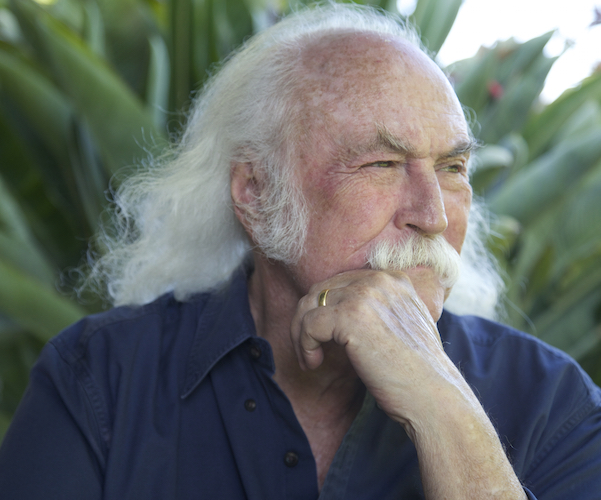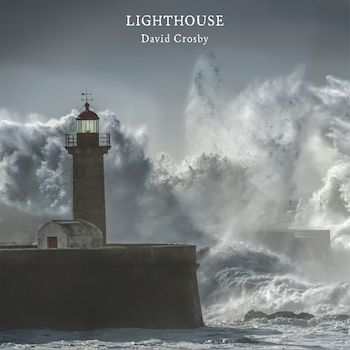Concert Preview: David Crosby Still Sees the Light
At age 75, there are more miles behind David Crosby than ahead of him, but he seems resolved to carry on with freak flag flying.

David Crosby. Photo: Henry Diltz.
By Jason M. Rubin
For popular music fans, 2016 can’t end soon enough. While great artists depart from this plane every year, 2016 seems to have been particularly cruel, stilling the voices of true legends such as Prince, David Bowie, Leonard Cohen, Merle Haggard, Leon Russell, Maurice White, and Glenn Frey. It seemed we would lose Joni Mitchell as well, though she appears to be on the mend. One artist who has cheated death more than once yet still is alive and active is David Crosby. At 75, he has just released only his fifth studio solo album, though of course he has an extensive discography based on his membership in the Byrds and Crosby, Stills & Nash (& Young), as well as a series of collaborative works with Graham Nash and with his son, James Raymond.
Speaking on the phone with Crosby last week in anticipation of his show at The Wilbur in Boston on December 12, he was pragmatic about the growing mortality rate of rock musicians; after all, the genre is more than 60 years old, so its longtime practitioners are all in their autumn years.
“It’s tough, man,” he said. “At my age I lose friends pretty regularly. It’s what we have to face. Not a pleasant thing.”
And yet David Crosby is not merely a survivor; he’s still writing, recording, and touring, as are other fellow septuagenarians such as Brian Wilson and Ian Hunter. What drives him?
“I love it,” he says matter-of-factly. “It’s hard being on the road. You never get a lot of sleep, you eat crap food in restaurants. But the singing and playing part of it is a joy.”
The fact remains, however, that it hasn’t been easy for Crosby, the quintessential Sixties hippie (Dennis Hopper’s character in Easy Rider is said to have been based on him, right down to the fringed jacket, and Crosby coined the term “freak flag” for counter-culture tresses in his 1970 song “Almost Cut My Hair”). He has had more than his fair share of drug problems and, combined with his fascination with guns, it has resulted in arrests and prison time. Yet whenever he was counted out, he came back.
The first song Crosby wrote when he got out of prison in the mid-1980s was called “Compass”; it appeared on the Crosby, Stills, Nash & Young reunion album, American Dream: “But like a compass seeking north/There lives in me a still, sure, spirit part.” Fast forward nearly 30 years, past health crises (including a liver transplant, diabetes, and heart problems) and his recent estrangement from Nash and Young, we find Crosby still seeking his own direction with his new album, Lighthouse.
Unlike his previous solo album, 2014’s Croz, which blended acoustic ballads and mid-tempo meditations with funk and jazz overtones (Mark Knopfler and Wynton Marsalis guested on the album, which included full-band arrangements on many of the songs), Lighthouse is more somber, dark, and sparse. Eschewing a rhythm section, Crosby and primary collaborator Michael League (from jazz/R&B group Snarky Puppy) produce mood paintings mostly with just acoustic guitars and vocals, with the occasional electric guitar, bass, piano, and organ adding color. In addition to Crosby and League, Becca Stevens and Michelle Willis provide vocals.
I asked Crosby how he came to choose a collaborator 43 years his junior.
“I’ve always listened to jazz, but I hadn’t heard of Snarky Puppy until a friend turned me on to them,” he said. “Their music is so well written, so joyful and communicative. It really caught my eye. I just had a feeling about Michael and thought it would be good to do some writing with him.”
Though Crosby was never a prolific contributor to CSN/Y albums, when it comes to his solo works, he seems to have no trouble composing or co-composing an album’s worth of material.
“I’ve gotten into writing with other people more than I used to,” he says. “I also take it more seriously than I used to. Now I try to work at it every day.
“Artists have sold this story that their life has to be in turmoil in order to write,” Crosby continues. “But the truth is for me I write when I’m happy. Music is a good thing, it’s a lifting force. It’s the best contribution you can make to the human race.”

Of the Lighthouse songs, a number are quite strong. “The Us Below” features cryptic guitar lines reminiscent of his classic “Déjà Vu” and lyrics of existential angst (“Why must we be eternally alone?”). There are two political songs on the album: “Look in Their Eyes” is about Syrian refugees and “Somebody Other Than You” is about those in power who think nothing of sending other people’s sons and daughters into war. I suggested to Crosby that in the past these would have been loud, angry songs; while his emotion about these subjects comes through, particularly on the latter song, the tunes don’t disrupt the overall mellow production vibe of the album. When I asked if this marked a change in him from angry young man to concerned sage citizen, he laughed. “Yeah, that’s a great description, thank you. I’m still angry, though. I don’t like war, I don’t like racism.” (In a recent interview, Crosby opined that the election of Trump was on a par with 9/11 in terms of its consequences on America.)
Lighthouse closes with a beautiful six-minute song co-written by Crosby and Stevens, “By the Light of Common Day.” By turns confessional and cathartic, Crosby sings early on: “As if being happy isn’t quite enough/Somehow I needed to make it rough/Rough enough to break it” but ends with, “Some great lifting force of light/Will come to balance fearful night/Raise its voice and then raise yours.”
Crosby reports that the new material, which he will be performing at The Wilbur, is going over very well with audiences. As on the album, on tour he is accompanied only by League, Stevens, and Willis. “The four of us have great chemistry,” he explains, “and we’re getting standing ovations each night.”
And so 2016 mercifully comes to a close. No one can know what 2017 will bring – other than a new David Crosby album, which he says is almost finished. A collaboration with his son, it is a full-band record like Croz rather than a continuation of the Lighthouse style. At age 75, there are more miles behind Crosby than ahead of him, but he seems resolved to carry on with freak flag flying.
Jason M. Rubin has been a professional writer for 31 years, the last 16 of which has been as senior writer at Libretto, a Boston-based strategic communications agency. An award-winning copywriter, he holds a BA in Journalism from the University of Massachusetts Amherst, maintains a blog called Dove Nested Towers, and for four years served as communications director and board member of AIGA Boston, the local chapter of the national association for graphic arts. His first novel, The Grave & The Gay, based on a 17th-century English folk ballad, was published in September 2012.
Tagged: Becca Stevens, David Crosby, Lighthouse, Michael League, Michelle Willis
